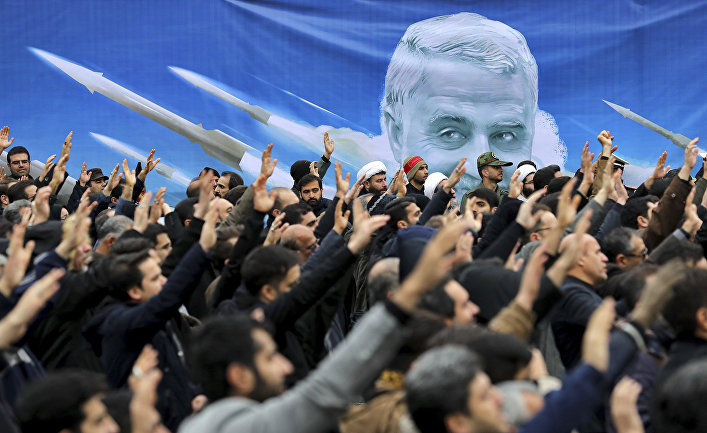A year without Soleimani: is the world facing another military conflict?
11.02.2021Author: Stanislav Zhelikhovskyi
PhD in Political Science, top specialist at Hennadii Udovenko Diplomatic Academy of Ukraine at the Ministry of Foreign Affairs of Ukraine
One year ago, on January 3, 2020, during the airstrikes of the US Armed Forces in Baghdad, the Major General and the Commander of the Al-Quds Special Forces of the Islamic Revolutionary Guard Corps and a military strategist of the Islamic Republic of Iran Qasem Soleimani was killed.

This event shook up the information space hard enough and it created ambiguous points of view in different parts of the world.
Iran started threatening with a military response. After that, the Iranian forces launched the rocket attack on the US military base in the neighboring Iraq. Moreover, Iran has announced a $ 3 million award for the assassination of the US President Donald Trump.
The situation has reached a critical stage. Ukraine was affected too. Thus, during the Iranian strikes, Ukrainian Boeing 737 was shot down near Tehran by mistake. By the way, the latter just now has pled guilty, promising to pay the victims’ families $ 150,000 each.
Early last year a number of political, diplomatic and expert circles predicted a new conflict in the Middle East, which due to the probable involvement of big players and the use of weapons of varying power, could easily escalate into the global one.
However, fortunately, neither the large-scale regional war nor even the global one came up. Although relations between the West led by the United States, and Iran have remained strained, the crisis has not flared up.
Fate has prepared another surprise for the mankind — the pandemic of the coronavirus disease COVID-19 which every country, with no exaggeration, began its own war with… This is what ensured us to remember the year of 2020 most of all, but not the new military conflict in the Middle East.
However, apparently, that was only a year-long silence… After all, just before the anniversary of Soleimani’s liquidation, Tehran resorted to threats with Washington again.
For example, the Iranian General Esmail Qaani, who headed the Quds Forces after Soleimani, stated that the assassination committed by the United States would not stop Iran’s resistance, having threatened America with the revenge «from the inside». The same rhetoric was heard from other high-ranking Iranian officials too.
It’s a really interesting thing that, in line with the threats, the Iranian authorities officially announced in the IAEA about their intention to enrich uranium to 20%, which is a violation of the nuclear agreement. And this was, by the way, after that the Iranian parliament adopted the law in December banning the admission of the UN inspectors to its nuclear sites.
In fact, Iran has returned to a policy of blackmail and terror, which gives not quite a vivid picture of the situation. After all, the intensification of the armed conflict has a more real basis than it had before. And there may be several reasons for this.
First, it is an adaptation to the conditions of the pandemic reality. If at the beginning of the coronacrisis, human civilization was shocked by the unprecedented extent of the contamination, having a vague idea of what to do next, now COVID-19 is no longer so frightening. In other words, all the problematic issues that were on the back burner a year ago are becoming relevant again.
Second, frequent threats and the decision to increase uranium enrichment could be a kind of pressure of Tehran on Washington in order to lift sanctions. After all, the time was picked quite well — a period when the head of the White House is being changed in the United States. As is known, in 2018, the President Trump announced the withdrawal of the United States from the Iranian nuclear agreement. For his part, Joe Biden announced America’s return to it. So Tehran may want to take advantage of this and hope for Washington be more flexible.
Third, the United States are currently experiencing bad times. The reasons are both the pandemic that hit America the most and the condition of the country Trump leaves behind, namely: the strong polarization of American society, the significant loss of the US authority on the international arena, and so on. That is, the countries like Iran can take advantage of the US’ vulnerability and move from threats to action. Especially since in autumn 2021 it will be exactly 20 years since the events of 9/11, which may serve as an additional incentive for Islamic fundamentalists to hit the Americans again on their own territory.
Fourth, the situation around Iran may be a part of the preventive policy of Israel, the main US ally outside NATO. Accordingly, the events like the assassination of Mohsen Fakhrizadeh the «father of the Iranian bomb» (there is thread on Israel’s involvement) and Israel’s airstrikes on the Iranian «Quds» special forces in Syria (both took place in November, after which a subsequent chain of events was set) may be the way to keep the United States away from the negotiating table with Iran. And perhaps even a kind of incitement to direct military confrontation between them.
Fifth, we should not forget about such extremely ambitious players on the world stage as China and Russia. Both countries have long been dreaming of moving America off the «big chessboard», each having its own partnership with Iran. The use of the «Iranian card» may be a part of the game between Beijing and Moscow against Washington.
Thus, a year after of the General Soleimani’s assassination, the Iranian issue returned to the agenda. And if in early 2020 the threats made to the United States by the Iranian authorities did not turn into real action, this year everything can be different.
It is clear that the new Biden administration and other leaders of the free world should be prepared for any developments. After all, the situation that was put on hold last year may continue this year. And it is quite possible that it will be in the form of a new military conflict, involving many players of the world politics.
The publication is carried out in cooperation with Newssky Media Group and the Institute for Democratization and Development.
Публікація здійснюється в рамках співробітництва Newssky Media Group із Інститутом демократизації та розвитку.

